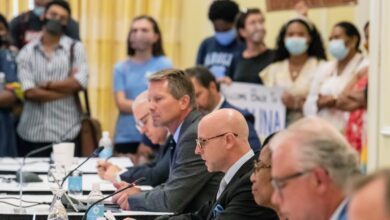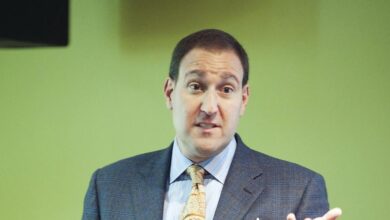How a Center for Civic Education Became a Political Provocation

The six-page Word document argued that the fundamental mission of a university — to seek truth — was threatened by “cancel culture and uniformity of opinion on campus.”
To counter those formidable threats, a new academic unit would act as a defense.
The Hamilton Center for Classical and Civic Education, named after the founding father, would promote freedom of thought, provide students with a “nonpartisan civic education” in American ideals, teach the great books of the Western canon, and improve the political and intellectual diversity of UF’s faculty body, according to the proposal.
By design, the center would operate differently from a typical academic unit. It would be located outside of existing departments and colleges. It would offer its own courses and degree programs and hire faculty members whose appointments would reside entirely in the center. An external board of advisers would recommend initial faculty hires to the president and to the university’s Board of Trustees, which together would make final selections. “If Hamilton Center faculty were to be hired through existing departments, the result would be a replication of what already exists,” the document said.
All told, a “robust and fiercely independent” center would “provide choice for Florida’s students and their parents” who are “dissatisfied with the present offerings.”
The proposal was sent by Adrian Lukis, a partner at a prominent lobbying firm and former chief of staff to Ron DeSantis, Florida’s Republican governor. He’d been hired to advocate for the center’s creation by a nonprofit organization with virtually no public profile, the Council on Public University Reform.
On January 22, 2022, Lukis emailed the proposal to Mark Kaplan, the university’s vice president for government and community relations. Kaplan wanted to know what UF’s president and provost thought of the pitch, so he sent the document their way.
Joseph Glover, the provost, said it wouldn’t fly.
“Adjustments would need to be made if this were to have any hope of passing muster internally with the faculty and externally with our accreditors,” Glover wrote in a document explaining his critiques.
For one thing, the “rationale” section of the proposal “lays out a conservative agenda to influence the curriculum that may not be well received,” the provost wrote.
For another, UF’s trustees hire only the president. The president does not hire faculty members, and directors of centers do not report to the president. To disregard those norms “would be perceived as political,” Glover wrote, “and would raise alarm at the Faculty Senate and the accreditor.”
Within six months the center, or some version of it, had been established at UF and had a director. That spring, Florida lawmakers allocated $3 million to create it.
It appears that the provost’s cautions were persuasive. UF has “been able to stand up the Hamilton Center within the university’s normal operating parameters,” Glover told The Chronicle in an email. Although some faculty members view the center as an ideological Trojan Horse, Glover said he saw “no evidence of a ‘conservative agenda’ being advanced.” The center’s director, who reports to the provost, told The Chronicle that the unit is nonpartisan.
The proposal and emails about it between UF administrators — which The Chronicle obtained through public-records requests and which have not been previously reported — shine light on an increasingly popular mode of intervention into public higher ed. In establishing the Hamilton Center, Florida joined other states — Arizona, Texas, and Tennessee — that have in recent years given millions to fund civics-related units at state universities. Plans are underway for such a school at the University of North Carolina at Chapel Hill, which some professors oppose. These moves have been inspired, at least in part, by criticisms that professors lean too liberal, that debate on campus is imperiled, and that teaching the foundations of Western thinking is no longer a priority.
Those criticisms are all the more alive in Florida — a state with a governor who has warned against universities becoming “hotbeds for stale ideology” and recently announced plans for a host of reforms to the state’s colleges, including the imposition of a Western-civilizations curriculum.
The council appears to be relatively new — it incorporated in Delaware in November 2021 — and to be active in at least one other state on a similar issue. According to the Virginia Public Access Project, a nonprofit that tracks lobbying and other political issues in the state, the council hired two lobbyists in 2022 for “government-relations services” related to Virginia’s Department of Education’s and the governor’s support of the Constitutionalism and Democracy program at the University of Virginia, directed by James W. Ceaser, a professor of politics. (Neither Ceaser nor the lobbyists replied to The Chronicle’s request for comment.)
Some information is available about the person listed in a public document as the council’s representative, Josh Holdenried.
Holdenried is a former associate director of coalition relations for the Heritage Foundation and the current executive director of Napa Legal, which advises Roman Catholic and other faith-based organizations on how to “avoid litigation, compliance-focused attacks, and unforced errors in the public square.” He’s also on the board of directors of Speech First, which describes itself as a membership organization of people who are fed up with “toxic censorship culture on college campuses, and who want to fight back.”
(Messages sent to an email address and cellphone number affiliated with Holdenried went unanswered. He told the Miami Herald in a statement that the council “educates policy makers about ways to enhance civil discourse, civics education, and liberal education in public universities.”)

John Tomac for The Chronicle
In Florida, the council’s efforts seemed to get rolling in early 2022 when it hired Ballard Partners for its services. According to public lobbying-compensation reports, the council paid the firm between $60,000 and $100,000 and between $20,000 and $60,000 to lobby Florida’s legislative branch and executive branches, respectively, in all of last year.
Mid-January 2022 is when Lukis, the lobbyist, approached the University of Florida about the Hamilton Center proposal.
On January 21, Kaplan, the UF government-relations administrator, texted Lukis to say it was great to see him at the state Capitol and reminded him to “please send the materials you mentioned,” according to a text message obtained by The Chronicle through a public-records request.
Lukis replied that the documents would be coming soon, once he had approval from his “client,” which he did not name. “I appreciate your help,” Lukis wrote to Kaplan. The next day, he sent along the six-page proposal. (Lukis did not respond to The Chronicle’s requests for an interview.)
Citing “alarming” results of a 2021 survey of UF students, the proposal homes in on responses that indicated intolerance of conservative viewpoints, along with a willingness to shout down speech, or even use violence to squelch it. (The actual findings of the survey reveal some nuance. For example, when asked about deploying violence to stop campus speech, 92 percent of students said it’s rarely or never acceptable.)
The faculty, the proposal says, exacerbate the problem: “At every major American university, the political uniformity of faculty fuels this conformism and cancellation among students.” It cites research from the National Association of Scholars, a group that promotes “virtuous citizenship,” that it says shows a small fraction of UF faculty members are conservative, and a report from the Center for the Study of Partisanship and Ideology — a think tank critical of identity politics and what it calls “the Great Awokening” — that found, in the words of the proposal, over a third of U.S. professors “openly admit that they would discriminate against conservative scholars professionally.” (Italics and other font changes for emphasis are the document’s own.)
Running in tandem with these issues is the problem of “pervasive civic illiteracy,” according to the proposal. It cites a survey by what was formerly known as the Woodrow Wilson National Fellowship Foundation that found only 38 percent of Floridians would pass a U.S.-citizenship test, and a 2017 essay by Derek Bok, a former Harvard University president, published in The Chronicle, that called for more civic education in college to combat widespread political apathy and polarization.
According to the proposal, the magnitude of these problems requires “a response of commensurate scale: the establishment of a new, robust, and fiercely independent center of learning and research.”
There is precedent both at UF and nationally, the proposal argues. The university’s Center for Latin American Studies exists outside any particular college, and has its own by-laws and faculty governance. The Hamilton Center should operate similarly. “Existing departments should not have the authority to block the appointment of externally recruited faculty to the center,” reads the proposal.
As for national precedent, the document makes ample reference to Arizona State University’s School of Civic and Economic Thought and Leadership. In 2016 the Arizona legislature mandated the creation of the school, which absorbed two existing centers that were supported by the Charles Koch Foundation.
“Arizona’s core insight was that the needs they saw could not be addressed by working within existing academic departments or by simply establishing a center to gather existing faculty to host guest lectures,” the document says. “What was necessary was a new academic unit with the ability to hire new faculty who can bring fresh perspectives to the table and develop a [sic] innovative suite of courses that expand, diversify, and enrich the intellectual community of the university.”
To recruit the center’s founding faculty members, UF trustees and the president should appoint an external board of nationally distinguished scholars to make recommendations, the proposal says.
The document ends with a timeline, budget request, and a draft of legislation that would establish and structure the center, to be passed during the legislative session. The timeline states that in addition to creating degree programs, recruiting faculty members, and offering public events, the center will provide civic-education training and programs to Florida’s high-school teachers and students. The proposal recommends a “start-up specific” state appropriation of $2 million for the 2022-23 academic year. In the future, the center would be funded by tuition revenue, state appropriations, and donations.
Overall, Glover observed, it “does not align well with either the administrative governance structure or the faculty governance structure” at UF.
While the document’s executive summary was “generally OK,” it was worth noting that there had been “considerable controversy nationally” about the “great books” approach to college curriculum, Glover wrote.
He also said that no academic unit reports to the Board of Trustees and/or the president, and that curriculum and degree programs must follow a process that includes the Faculty Senate’s approval. To exceptionally change that reporting structure or circumvent that process would raise issues with the university’s accreditor, Glover wrote.
Glover also noted that the Center for Latin American Studies almost never appoints faculty members independent of UF’s colleges. “It does so most often in collaboration” with those colleges, he wrote.
Comparison with ASU’s civic school did not carry weight with Glover. The school “often takes a high-handed approach to academic reorganization, curriculum, and instituting new programs (often with a short shelf life),” he wrote. “Need I say more?”
(Asked about Glover’s assessment, Paul Carrese, who directs the ASU school, said in an email that the university is hailed for being innovative, and that a “more energetic administrative role” at ASU works within the typically slower-moving faculty-governance process to develop programs and curriculum.)
Glover suggested potential fixes, among them: Involve deans and the Faculty Senate in establishing a center that reports to the provost; search for its founding director and faculty members with a committee of internal and external members, and have the provost make the final selections; and ensure that center faculty members propose courses and degree programs “through the standard curriculumvetting procedure.”
Or, Glover suggested, Kaplan could propose an alternative: that the legislature direct money for universities that wished to offer courses that achieve the goals of the proposal, rather than create a center.
Glover emailed his thoughts to Kaplan and Kent Fuchs, UF’s then-president, on January 23, 2022. A few days later Kaplan told them that he’d taken “a first shot” at editing the draft legislation that was included in the proposal.
Those edits deleted the Board of Trustees’ role in choosing the center’s director and appointing an advisory board to recruit the inaugural faculty. Kaplan also inserted language that the advisory board should include scholars from across the university, as well as the country.
And Kaplan deleted these two sentences entirely: “Following a national search, the Board of Fellows shall transmit to the Board of Trustees a list of recommended finalists for each position. The Board of Trustees and President shall appoint the faculty Director and two founding faculty members of the Hamilton Center.” Kaplan proposed instead that the advisory board would assist the “university,” not trustees, in identifying those hires.
The next day, Glover signed off.
“I can live with this!” he wrote.
Four minutes later, Kaplan emailed his “suggestions” to Lukis, to discuss. “This is not yet fully vetted — want to see about general alignment first,” Kaplan told the lobbyist.
Clearly, Lukis’s client had notes. Two days later, on January 29, Kaplan emailed Glover and Fuchs again with a “counterproposal” that he had received.
We study Western civilization because we are part of it.
The counterproposal re-inserted the Board of Trustees’ role in appointing an external advisory board. It added back this sentence, but struck the word “recommended” before the word “finalists”: “Following a national search, the Board of Fellows shall transmit to the administration and Board of Trustees a list of finalists for each position.”
The counterproposal also struck Kaplan’s addition that the advisory board include scholars from UF. And it said the faculty director would “report to” the president and provost, as opposed to being “appointed by” those leaders.
The provost had a major objection:
“Under no circumstances can an external board be the sole selectors of finalists for a faculty position,” Glover wrote back. He edited the draft legislation to remove that provision. (Fuchs chimed in to say that Glover knew what was best and that he, the president, would not suggest edits.)
In the midst of this negotiation, a Florida lawmaker took a step toward making the Hamilton Center a reality. On January 27, Keith Perry, a Republican state senator, filed a budget request asking for $2 million in nonrecurring state funds to create the center. The request reiterates the goals of the center included in the proposal sent to UF. It lists Lukis as the lobbyist behind the issue and Holdenried of the Council on Public University Reform as the “requestor.”
Perry was not available for an interview with The Chronicle. He told the The Gainesville Sun he hoped the center would offer what he called a “classical education,” based on “fundamentals based on individual liberty” and historical fact. He also said that the “goal is not to counter any other educational model” and that the university, not lawmakers, would design the center’s curriculum.
He told the Miami Herald that he met with Lukis only to discuss the center. Of the Council on Public University Reform, he said, “I don’t know who they are.”
What happened next is unclear. Kaplan, through a university spokesperson, declined an interview, and he did not respond to The Chronicle’s emailed questions about his back-and-forth with Lukis. Instead, UF sent an emailed statement. The Hamilton Center’s creation was “a give-and-take collaboration” between the legislature and the university, it says. For the university to review proposed legislation and provide input is “not uncommon.” The statement also said that “at no point did the university have any objections to the proposal on ideological grounds.”
As for the Council on Public University Reform, the university did not interact with the group “before, during, or after this process,” the statement says. “We were focused on the content of the proposal rather than the sponsor.”
Florida lawmakers ended up granting the center $3 million in state funds, a million more than what was originally requested.
The center’s enabling legislation, which was inserted into an education bill, is worded similarly to what was presented to UF but is far shorter. It does not include any of the sections on how the center will be structured — the meat of what university leaders negotiated over. Instead, the legislation simply iterates the center’s goals, including that it will provide civic-education training for public schools.
Because that legislation “did not contain many operating constraints,” UF was able to establish it within the university’s “normal operating parameters,” Glover, who recently announced he is stepping down from the provist’s job in July, said in an email.
UF’s new president, Ben Sasse, offered an endorsement of the center. “This isn’t controversial: The Hamilton Center is an important part of the UF community because we’re committed to the rigor of free thought, civil discourse, and intellectual diversity,” Sasse said in an emailed statement.
“It’s hardly a secret that too many institutions shy away from viewpoint diversity — not UF. … Gators are tough enough and wise enough to engage competing ideas, because that’s actually the point of education.”
Recently, the chair of the University of North Carolina at Chapel Hill’s Board of Trustees told Fox and Friends that a new School of Civic Life and Leadership was an attempt to “remedy” the absence of right-of-center views on campus. The school will provide “equal opportunity” for both sides to be taught, the chairman said. (It’s not clear how the school will be funded, but a draft budget memo calls for $5 million in recurring funds for the next fiscal year, The Chronicle reported. The memo notes, “We expect State funds to be matched by private support.”)
Last year, Bill Lee, Tennessee’s Republican governor, announced the Institute of American Civics, to be established at the University of Tennessee at Knoxville with an initial $6 million from the state. Lee touted the institute, which has similar goals as the Hamilton Center, including educating students on America’s founding, as “a beacon celebrating intellectual diversity at our universities.” The institute received bipartisan support in the legislature.
In 2021, Texas lawmakers inserted $6 million into the state budget to help fund a new conservative think tank dedicated to individual liberty and free-market principles at the University of Texas at Austin. It is now called the Civitas Institute. The Texas Tribune revealed through public records that university officials, donors, the chair of the UT System Board of Regents, and Texas’ Republican lieutenant governor had worked together behind closed doors to create the institute, which says its aim is to “help American higher education return to itself by fostering the spirit of civic leadership and responsibility among our students,” according to its fall-2022 newsletter.
Perhaps the best known are Arizona’s “freedom schools” — ASU’s School of Civic and Economic Thought and Leadership and the University of Arizona’s department of political economy and moral science. In 2016, Arizona lawmakers inserted a budget item to fund them. “There’s a considerable left-wing bias at the university educationally, in terms of the faculty, student organizations, colloquiums, and presentations,” an Arizona Republican who chaired the senate appropriations committee said in 2018. “A small amount of money to get some balance is well worth the expense.”
Establishing such units has been controversial for a labyrinth of reasons. Critics argue that the state money could be better spent; that a curricular emphasis on the Western canon erases the contributions of women and racial minorities; that higher ed’s supposed liberal bias is greatly exaggerated and does not need active combatting; that these academic units are an attempt to thwart the traditional mechanisms of university governance; and, perhaps most crucially, that politicians should not be dictating via line item what’s taught in college classrooms.
Carrese has heard — if not all, then most — of those criticisms. A career academic and political scientist, Carrese left the U.S. Air Force Academy, where he’d taught for nearly two decades, to become the ASU school’s first director. Even before he arrived, there was already a torrent of backlash. Yet the need for such a school was self-evident to Carrese.
Why would you undercut the legitimacy of our department by essentially creating a parallel institution that would compete with us?
“Look around, in American politics,” he told The Chronicle. “Is there overwhelming evidence that there’s a really great story about Americans’ civic knowledge, citizens understanding our form of politics and our form of government? Is there a story about how well our political culture and our political institutions are functioning? No. There’s a really terrible story out there about, first, civic ignorance — citizens who don’t know about our form of politics and all its complications. And then you might wonder, is that connected to … at one extreme, anger, and at the other extreme, apathy?”
Though Republicans led the charge on the school’s formation, Carrese cast the issue of civic education as a bipartisan one. He gave as an example the book What Universities Owe Democracy, in which Ronald J. Daniels, president of the Johns Hopkins University, argues that American colleges have failed to teach or train students in the values of democratic institutions and norms, to the country’s detriment.
“This is coming from the center left — prominent leaders, and prominently argued,” Carrese said.
This,” he wrote, “is not a partisan issue: The most powerful and articulate voices calling attention to this range from Jonathan Haidt and Cornel West to Robert P. George.”
Stinneford sees the Hamilton Center as part of the solution. He proposed that the center host a series of “Hamilton conversations” and debates open to anyone at the university modeled on Claremont McKenna College’s Marian Miner Cook Athenaeum speaker series. He presented that and other goals of the center — like hosting visiting fellows and creating an interdisciplinary undergraduate curriculum — at a Faculty Senate meeting in October.
“Can we have a genuine debate on a matter of public concern and still be friends and still maybe even love each other? That’s what we hope to model,” Stinneford told the professors in attendance.
He also said that he had not met with any lawmakers to discuss the center’s priorities, nor had he known about the Council on Public University Reform’s funding request until it was reported in the news media. He was told he’d coordinate with the provost, not the legislature, to build the center.
“What I want to do with the center is something similar to what I do with my scholarship, which is, I’m not about partisan outcomes. I’m not about any particular party. I am about adding to the discourse,” said Stinneford, who studies the cruel-and-unusual-punishments clause in the Eighth Amendment.
Some faculty members in UF’s history, English, and political-science departments are skeptical. The Chronicle spoke with 10 scholars whose concerns run the gamut from, in their view, the ideological orientation of the center to its duplication of existing UF units — including the Bob Graham Center for Public Service — to what they say are the flouting of certain norms when making new hires.
“Why do you need a separate agency within the existing University of Florida to offer classes in the very same fields which we already offer classes?” asked Lillian Guerra, a professor of modern Latin American history.
She added, “Why would you undercut the legitimacy of our department by essentially creating a parallel institution that would compete with us?”
Stinneford said in an email that the center “will build on existing strengths” at UF “but is unique in offering a multidisciplinary civics-focused curriculum.”
Guerra and others take issue with how Stinneford went about hiring faculty members, specifically the center’s associate director, a historian, and his wife, an English scholar. From their perspective, those hires happened quickly, without any meaningful input from existing UF departments.
Aside from being invited to attend a job talk, “no history faculty that I know of were consulted,” said Jon Sensbach, who chairs the history department, of the associate director’s hire. “So that’s one of the things that raised some eyebrows.”
Glover said in an email that faculty members had been invited to “provide input” about proposed hires when they visited campus. Stinneford said in an email that the center followed UF policies and procedures on hiring, and that it consulted subject-matter experts inside and outside the university. He also said that no faculty members had voiced concerns to him directly. Amanda J. Phalin, who chairs UF’s Faculty Senate, said leaders of the body’s welfare and academic-policy councils looked into the center’s creation and determined that all university regulations were being followed, on an accelerated timetable.
For several faculty members, the center’s murky origins loom large. Jeffrey S. Adler, a professor of history, believes the Hamilton Center cannot be separated from the mysterious group from which it arose, or from the state’s larger political context. He said he and many of his colleagues feel “overwhelming discomfort” with “the potential for these classes being ideologically fueled.”
And Adler is dubious of what he views as the center’s potential mission, and its place within academe. “Thirty years ago, I think, in good faith, people could maintain their credentials as professional historians and say, ‘I want to use my scholarship, my teaching, to demonstrate the superiority of Western culture,’” he said. “No one has said anything of that sort in my discipline, at least, for a long long time.”
Stinneford strongly objected. The center’s purpose is to study and teach about Western history, including its failures as well as its successes, not to make any claims of “cultural superiority,” he said in an email to The Chronicle.
“We study Western civilization because we are part of it,” he said. “We cannot fully know ourselves without knowing where we came from.” He quoted a paean to the Western literary and philosophical canon from W.E.B. Du Bois’s The Souls of Black Folk to make the point that learning about the Western intellectual tradition helps students “think through the great questions of life and prepare themselves to participate as citizens.”
Provost Glover told The Chronicle that he had “not detected any ideological bias” in faculty credentials or the proposed curriculum. His initial objections “had nothing to do with any perceived ideological agenda of the legislature,” he said in an email. Rather, his objective was to make the center “‘workable’ within the university structure.”
The provost may have succeeded in the short term in making the center “workable” for UF. But if Governor DeSantis is successful, it may eventually operate more like what was originally envisioned.
The governor recently proposed sweeping changes in Florida’s higher ed system to keep it from, in his words, imposing “ideological conformity.” Institutions’ presidents will be able to “directly” recruit professors and boards of trustees will “directly” approve those hires, to circumvent faculty committees.
He also proposed that the Hamilton Center become the Hamilton College by 2024, and suggested a budget of $5 million toward operations and $13 million for capital needs, like its own building and dorm rooms.
And, said the governor, the soon-to-be-college, plus two existing academic units at other Florida universities, would have a pipeline “for faculty recruitment and have the trustees recruit people to go directly there.”
“Because at the end of the day,” DeSantis said, “you want these things to be different from what the orthodoxy is.”
Source link






